Foreign exchange rates, also known as forex rates, are the rates at which one currency can be exchanged for another. These rates are essential for businesses, investors, and travelers who want to understand the value of their currency in relation to other currencies. But who decides forex rates? In this article, we will explore the key factors that influence forex rates and the entities that determine them.
Factors that influence forex rates
The forex market is the largest financial market in the world, with an estimated $5.3 trillion in daily trading volume. This market is influenced by various factors that can affect exchange rates. Some of these factors include:
1. Interest rates: Interest rates have a significant impact on forex rates. Higher interest rates attract foreign investors, which increases demand for a currency and drives up its value. Conversely, lower interest rates decrease demand for a currency, which can cause its value to decline.
2. Economic performance: A country’s economic performance can also affect its currency value. If a country’s economy is performing well, investors are more likely to invest in that country, which can increase demand for its currency. Conversely, if a country’s economy is struggling, investors may pull out their investments, which can cause its currency value to decline.
3. Political stability: Political stability can also impact a country’s currency value. If a country has a stable political environment, investors are more likely to invest in that country, which can increase demand for its currency. Conversely, if a country has political unrest or instability, investors may pull out their investments, which can cause its currency value to decline.
4. Supply and demand: Like any market, the forex market is influenced by supply and demand. If there is a high demand for a currency and a limited supply, its value will increase. Conversely, if there is a low demand for a currency and a high supply, its value will decrease.
Entities that determine forex rates
There are various entities that play a role in determining forex rates. These include:
1. Central banks: Central banks are responsible for setting monetary policy and controlling the money supply in a country. They also play a significant role in determining forex rates. Central banks can influence forex rates by adjusting interest rates, buying or selling their currency on the forex market, and intervening in the market to stabilize their currency’s value.
2. Commercial banks: Commercial banks are also important players in the forex market. They act as intermediaries between buyers and sellers of currencies and can influence forex rates by buying or selling currencies on behalf of their clients.
3. Government agencies: Government agencies, such as the Treasury Department, can also influence forex rates. They may implement policies that affect a country’s economy or exchange rates, such as tariffs, trade agreements, or tax policies.
4. Speculators: Speculators are individuals or institutions that trade currencies for profit. They can influence forex rates by buying or selling large amounts of currencies, which can affect supply and demand and impact exchange rates.
Conclusion
Forex rates are determined by a combination of economic, political, and social factors that influence supply and demand in the market. The entities that determine forex rates include central banks, commercial banks, government agencies, and speculators. Understanding the factors that influence forex rates and the entities that determine them is essential for businesses, investors, and travelers who want to make informed decisions about currency exchange.





